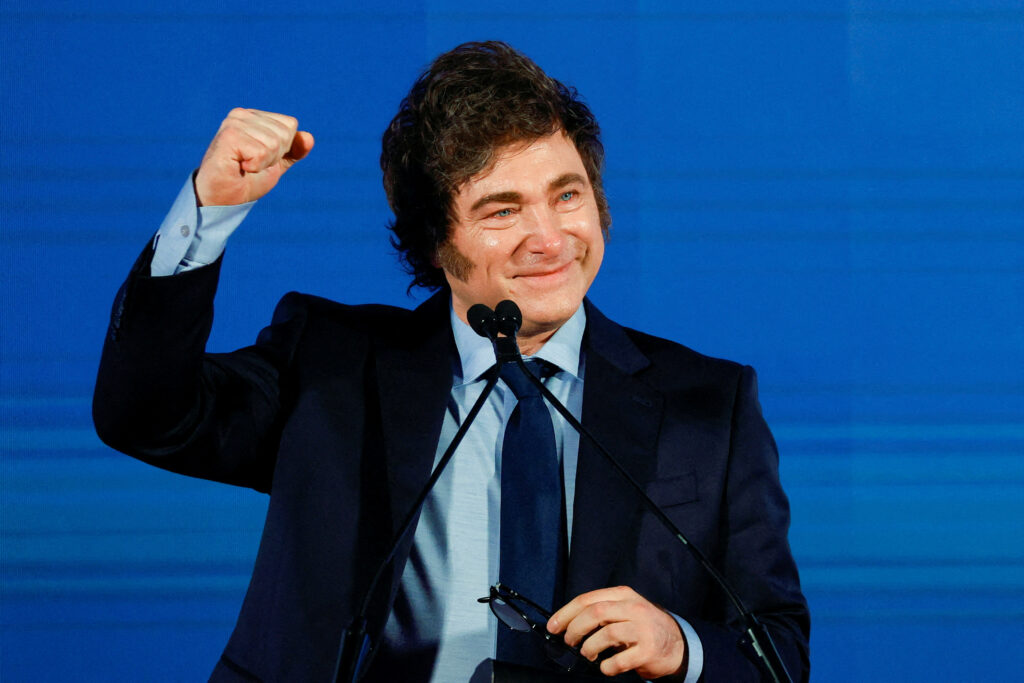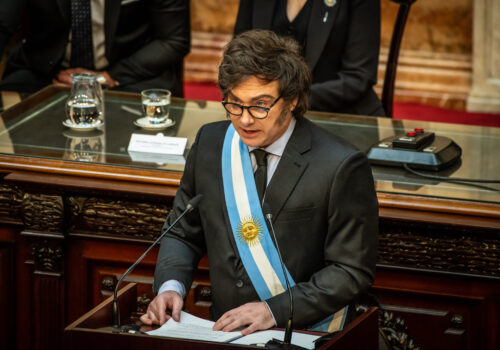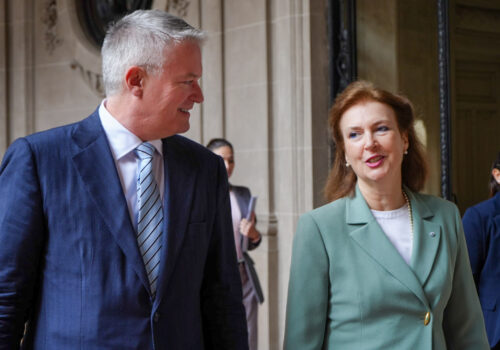For much of this month, praise for Argentina’s economic successes has become almost a cliché in newspapers throughout the world after President Javier Milei reached the milestone of one year in office surrounded by a sense of triumph. Milei has also projected this optimism, saying in a speech from the Casa Rosada on December 10 that the country can look forward to a “future of prosperity” that for many Argentines was still “unimaginable.” With President-elect Donald Trump entering the White House next month, Milei will have a strong ally in Washington. But how can that be converted into more wins at home?
Much has changed a year on from Milei’s inaugural—and memorable—assertion that “no hay plata!” (there is no more money [for public spending]). As Milei made front-page news, catching the attention of the Financial Times and the Economist, he has also earned the praise of world leaders such as Trump and members of the president-elect’s inner circle, such as tech mogul Elon Musk. Meanwhile, financial markets have continued to celebrate as Argentina’s stocks have roared upward, providing the highest yearly returns of any other economy and doubling those of the second-best performing markets (as expressed through country exchange-traded funds).
The government has doubtless made much progress in areas in which it was expected to struggle, restoring significant levels of confidence to an embattled economy that just a few days ago was officially announced to be out of a severe recession. As Argentina heads into a critical year for the government’s economic strategy, Milei will need to maintain voters’ buy-in and market confidence for his policies while pursuing further economic reforms.
2024: A triumphant first quarter of a four-year term
As Guido Sandleris, former president of the Central Bank of Argentina (2018-2019), argued in our 2024 Atlas, before Milei’s inauguration the Argentine president had correctly identified the country’s “real problems”: inflation, high and inefficient public spending, political capture, and endemic corruption, among others. For Sandleris, the challenges for the Milei administration were clear: The country was on the verge of hyperinflation, the central bank had negative net foreign exchange reserves, the fiscal deficit was out of control, and utilities and prices were long outdated, forcefully frozen in place by the previous administration. Milei had also come into office with a limited political toolbox, holding a minority in congress that was not even impeachment-proof and relying on a small party structure.
Considering this initial outlook, the results of the past year are noteworthy. The government instituted aggressive budget cuts, spending freezes, and a deregulation campaign. It also passed significant legislation (which revealed the government’s ability to negotiate with the opposition) and successfully implemented a tax amnesty scheme to attract undeclared banking deposits. In the wake of these policies, Argentina’s economy has gained a more solid footing and is on track for normalization. Inflation has come down to pre-2023 crisis levels, the economy is showing signs of recovery, consumer and investor confidence are on the rise, and government bonds have regained much of their value.
Two figures illustrate this success: the drop in Argentina’s emerging markets bond index spreads, which is a key measure of sovereign risk, and the rise of projected investment as a share of gross domestic product, both of which we have analyzed. But perhaps the most notorious achievement has been its commitment to fiscal responsibility, a laudable effort in the context of Argentina’s chronic tendency to incur unsustainable public spending.
Optimism is perhaps the best way to describe the current moment in Argentina, and recent opinion polls illustrate this. Milei has succeeded even in outperforming President Mauricio Macri, his most ideologically proximate predecessor, in his approval rating at the end of his first year in office across social sectors, according to Gallup. As Milei put it in an interview with the Financial Times in October, “I have a 50 percent approval rating after carrying out the biggest austerity program in our history. It’s a miracle, isn’t it?”
How can Milei finish out a strong first half in 2025?
Milei, who played goalie in soccer in his youth, understands that it’s critical to finish out a strong first half to win a match, and restoring Argentina’s macroeconomic stability was never going to be accomplished overnight. The question now is whether the administration will be able to maintain support for its policies while deepening its reform agenda. Next year’s midterm elections in October, in which the government aims to strengthen its vulnerable position in congress, will play a large role in setting the agenda for Milei’s second year in office.
Although the outlook is much brighter than it was a year ago, challenges still loom in 2025. The main objective will be to deliver growth, estimated at 5 percent by the International Monetary Fund (IMF), following two years of consecutive drops (1.6 percent in 2023 and an estimated 3.5 percent in 2024) while continuing to reduce inflation. And the latter is far from over: Banks estimate that prices will rise over 30 percent in 2025, while the government’s own more optimistic estimates in the 2025 budget proposal predict that prices will rise by 18 percent (annualized inflation in the United States this past November was 2.7 percent). Markets will also be watching the elections closely. If the economy fails to deliver much-needed growth and inflation remains stubborn, it could cause a sudden deterioration in market confidence. However, the opposition’s fragmentation, itself the result of the 2023 economic crisis and the disruptive victory of an outsider like Milei, may ease the administration’s path to make significant gains.
Nevertheless, the government has taken steps to mitigate risks and open new opportunities to strengthen the country’s economic recovery in the new year—nowhere more prominently than on the world stage. Milei scored several major foreign policy wins, including the beginning of its Organisation for Economic Co-operation and Development accession process. And the South American economic bloc Mercosur, of which Argentina is a member, signed a historic trade deal with the European Union earlier this month.
Argentina’s stocks reacted positively to Trump’s election in November, a clear sign of the market’s belief that the next administration will yield net positive effects for Argentina. Milei has developed a close relationship with Trump. The Argentine president has openly stated that he thinks Trump will play a decisive role within the IMF’s board to push for a favorable renegotiation of Argentina’s outstanding program with the IMF. This could include the disbursement of new funds and a rollover of repayment deadlines, as Argentina owes the IMF over forty billion dollars at a time when its net international reserves stand at negative three billion dollars). Indeed, US Senator Marco Rubio, Trump’s nominee for secretary of state, has argued that the United States should use its influence at the IMF to help restructure Argentina’s debt, which he said would “create breathing room for Milei to enact much-needed reforms.” One of the major sticking points in Argentina’s negotiations with the IMF is the Fund’s belief that Argentina should end its outdated system of currency controls (the “cepo”). Ending the cepo would likely spur growth and drive investment but may also put pressure on the peso—and thus reaccelerate inflation—something that the government will likely avoid until after the midterm elections in October.
At the same time, Argentina has reached a new moment in its relationship with China, a key trading partner, following months of tensions triggered by the president’s earlier critical rhetoric. Illustrating this case, in June, China renewed its currency swap with Argentina, saving the country from a sudden loss of much-needed foreign reserves. Chinese leader Xi Jinping and Milei then met for the first time on the margins of the Group of Twenty (G20) summit in November.
Domestically, important announcements such as the end of the recession and recent investments announced under the government’s investment promotion regime, including $2.5 billion from Rio Tinto for lithium mining and a multicompany investment of three billion dollars for a new oil pipeline, both of which happened just this month, indicates that rising investor confidence will begin to fuel the revitalization of Argentina’s historically low investment levels. This year was also significant for the country’s energy independence, and rapidly rising shale oil and gas production has saved the country billions in energy imports while boosting exports, a trend that will only deepen in coming years. Argentina has even started negotiations with Brazil, despite public tensions between President Luiz Inácio Lula da Silva and Milei, to explore the possibility of exporting Argentina’s booming natural gas production there.
Milei’s economic policies have exceeded expectations in the administration’s first year. But given its precarious starting point, Argentina is still vulnerable to external economic shocks and sudden losses of investor confidence. As such, the administration should consider moving forward with a series of key steps that may drive growth beyond post-crisis recovery values and further cement the market’s confidence in the economy. Such measures could include accelerating the end of the cepo and allowing the peso to float freely (and thus making Argentina less vulnerable to the ongoing devaluation of the Brazilian real). The government should take steps to reassure markets of its ongoing commitment to fiscal responsibility and healing its credit rating. These measures could include the negotiation of a new and sustainable IMF program, the passing of the long-delayed 2025 budget, and the continued elimination of special protections that for decades successive governments have awarded to uncompetitive segments of the economy.
The first year of Milei’s administration will be remembered as a surprisingly strong start to an ambitious reform agenda. For that agenda to be fully realized, Milei will need to continue to pursue bold reforms while maintaining public support and market confidence in 2025.
Ignacio Albe is a program assistant with the Atlantic Council’s Adrienne Arsht Latin America Center.
Jason Marczak is vice president and senior director at the Atlantic Council’s Adrienne Arsht Latin America Center.
Further reading
Thu, Dec 5, 2024
What to know about Argentina’s new investment promotion regime
New Atlanticist By
The Incentive Regime for Large Investments could build investor confidence in the Argentine economy, but the policy faces significant economic and political challenges.
Fri, Jun 21, 2024
Milei’s biggest challenge is to foster the societal consensus that Argentina needs to thrive
New Atlanticist By Martin Mühleisen
Despite President Javier Milei’s popularity with a large part of the Argentinian public, failure to array Congress behind his movement could again leave the country with a half-completed reform agenda.
Sun, Sep 8, 2024
Argentina’s foreign minister: Why my country wants to join the OECD
New Atlanticist By
In seeking to join the OECD, Argentina is on a path to economic reforms and reputational benefits that can restore investor confidence in the country, writes Argentina’s minister of foreign affairs.
Image: Argentine President Javier Milei gestures during the political festival Atreju, organized by Italian Prime Minister Giorgia Meloni's Brothers of Italy (Fratelli d'Italia) right-wing party, in Rome, Italy, December 14, 2024. REUTERS/Ciro De Luca.



